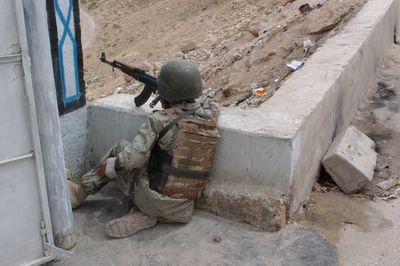"Crisis of Attrition"

(c) Roger Leo
Iraqi soldier on patrol in Haqliniyah.
ANBAR (MAY 2006) – While the wisdom or necessity of the invasion of Iraq four years ago remains an open topic, the attention of Americans, particularly those on the ground in the Middle East, increasingly focuses on how to extricate U.S. forces from a persistently dangerous and seemingly open-ended conflict.
The consensus among commanders is that stronger Iraqi security forces are the best – perhaps the only – way for U.S. forces to downsize and, ultimately, leave.
But enormous problems – of recruitment, pay, supplies and personal safety – are hampering efforts to build up the Iraqi Army and the Iraqi Police.
Officers assigned to train Iraqis in al Anbar Province say the problems have reached critical proportions.
“We’re in a crisis of attrition,” said Lt. Col. Jeffrey J. Kenney, 48, of Hartford, Conn.
Lt. Col. Kenney has been a Marine 31 years, the first 12 rising to the rank of gunnery sergeant, the rest as an officer.
He is the Military Transition Team chief for the Iraqi Army’s 2nd Brigade, 7th Infantry Division .
“We’re supposed to have 2,400 Iraqi soldiers, we have 1,600. There’s no banking system, so when they are paid, they have to take the money home. Normally they work 21 days on and a week off. Since we’re in al Anbar, which is insurgent country, it takes days to go home through some of the most dangerous places on earth.”
More than $1 million a month is involved in supporting the 2nd Brigade, 7th Infantry Division – including $670,000 in pay and $250,000 for food, water and fuel – but that money has not been forthcoming since February.
Besides no pay and little or no supplies of food and water, Iraqi soldiers serve with no fixed term of enlistment, Lt. Col. Kenney said, which means they can walk off the job at any time.
He listed other problems that included inadequate equipment and materiel; a literacy requirement that prevents otherwise willing recruits from enlisting; and murder and intimidation campaigns that scare people away.
“If those problems could be fixed, we could retain Iraqi troops and start winning the war,” Lt. Col. Kenney said.
“If we could solve the retention problems, we could step back and be support, and Iraqis could take over. And we need that. Americans don’t have enough people to control the battle space. We need the Iraqis and we have to stop the hemorrhaging.
“The only thing the insurgents have to offer is threats, is terror, and that’s powerful. Community police work is resolving disputes – I don’t’ see a lot of that, what we have is murder and intimidation and IEDs.
“The only way we’re going to win the people is to protect them – we have to have enough people, we need cops to protect the people, and need the Iraqi Army to protect the cops.
“People are sick of seeing foreigners driving around their streets with guns, making people pull over and stop.
“To really win the war, Iraqi forces have to do it,” he said.
“If the Iraqi Army was half again as numerous as we are now, we’d see two years of strife and then things would settle down.
“Whoever sticks it out wins, and they count on us quitting. Doing it, sticking with it and not giving up is the key,” Lt. Col. Kenney said.
“We need more Iraqi guys, and that means we have to fix the problems with retention. Otherwise it’s like pouring water into a bucket with a hole in the bottom,” he said.

0 Comments:
Post a Comment
<< Home